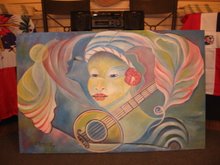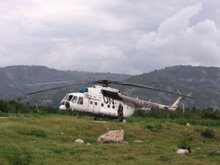
NATIVE CHIEF

THE WEDDING DREAM

THE KING SERENADES HIS QUEEN

TOTEM POLE

A trip to Haiti has inspired a gallery & book store offering fair trade art & coffee, live music on occasion & the opportunity to simply enjoy life with others in an interesting neighborhood in Historic Northeast Kansas City. Artwork, jewelry & other items are on display from Brasil, Dominican Republic, El Salvador, Guatemala, Haiti & North America, including Mexico!


 Currently, all residents of LaHoya, which include hundrends of friends of mine, are now "living" in a school building several miles away. Estimates indicate that it will be two or three weeks before waters subside enough to being cleanup efforts. In the mean time, these folks must eat good food and drink clean water, and know that the world is here to support them. So here's my question:
Currently, all residents of LaHoya, which include hundrends of friends of mine, are now "living" in a school building several miles away. Estimates indicate that it will be two or three weeks before waters subside enough to being cleanup efforts. In the mean time, these folks must eat good food and drink clean water, and know that the world is here to support them. So here's my question: Many exciting things are happening at Kafe Kiskeya, located in Historic Northeast Kansas City MO at 3226 East 12th Street, which I want to share with you! So, I hope to see you soon at the following events. Be sure to check the blog and myspace sites often for more happenings Kafe Kiskeya Blogspot & Kafe Kiskeya MySpace !
Ernie Henderson will perform!
Dream Studio Presents 3 Innocents & A Spirit
All the way from Haiti, this production by the N a Sonje Foundation explores 700 years of history in less than an hour, and offers a post-production discussion between cast and audience.
Dream Studio and Kafe Kiskeya present "3 INNOCENTS AND A SPIRIT", a historical drama depicting the interactions of the people from the Americas, Europe, and Africa, on September 28th at 7:00 pm at Dream Studio, 711 East 31st Street, KCMO 64109. Tickets are $10 and can be reserved by calling 816-914-5096.
"3 INNOCENTS AND A SPIRIT" is performed by two Haitian men representing the Native American and African cultures, respectively, and an American woman representing the European culture. Dressed in era costumes, the three actors weave together mime, interactive participation, authentic historical texts and music to demonstrate the progression and effect of historical events.
The play exposes the destruction and acculturation of the Native Americans and the enslavement of Africans, which resulted in a transfer of wealth and natural resources to Europe. During the drama the Native American, European, and African characters experience a transformational awakening through which they realize their physical and spiritual losses, as well as their mutual need for one another. The three characters then offer each other gestures of compassion and forgiveness, ultimately recognizing the need for healing and reconciliation.
The cast will engage in a post-production discussion, creating an open forum for ideas and solutions that can help towards the healing of our fractured societies. Further information can be gathered at the following sites: 3 Innocents, N a Sonje Foundation, and Memory Village.
For more information about the play contact Sarah Cool at 816.914.5096 or coolsarahs@hotmail.com. Visit Meaningful Communications to download a flyer.
Mauricio Zuniga kicked off Kafe Kiskeya’s 1st Thursdays series of events on September 6th, 2007. His paintings will be on display and for sale throughout the entire month. The following artists have confirmed their participation in the months ahead:
October 4th Maurice Copeland, painter & poet
November 1st Arts in Prison, paintings and photographs AND John Paul Gallagher, photographer

 This week has been full with several activities at Kafe Kiskeya, including An Evening with Djaloki (http://djaloki.blog.com/) on Monday night where 18 folks learned about Memory Village (http://www.memoryvillage.blogspot.com/), a project in Haiti, and a play which supports it, 3 Innocents and a Spirit (http://www.3innocents.blogspot.com/).
This week has been full with several activities at Kafe Kiskeya, including An Evening with Djaloki (http://djaloki.blog.com/) on Monday night where 18 folks learned about Memory Village (http://www.memoryvillage.blogspot.com/), a project in Haiti, and a play which supports it, 3 Innocents and a Spirit (http://www.3innocents.blogspot.com/). 



Timoun Yo, written by Mona Augustin about Haitian street children, is performed here in Kreyol by Mona, Welele, Ron, Nicole, Carla and Levy.
TIMOUN YO (lyrics)
Gad timoun nan lari yo
Y ap viv tankou zanimo
Pèsonn pa pran penn pou yo
Dirigan pa fè anyen pou yo
Paske se ed timoun sa yo
Ki fè yo antre gwo mago
Nan men etranje ki fè lacharite
Ref:
Timoun yo
Ede yo
Timoun yo
Ede yo
Si n pa vle yo fè sak dwòl
Fòk nou mete yo lekòl
Pou yo aprann li ak ekri
Demen pou yo gon meye vi
Si non nou k ap premyè viktim
Lè anpil nan yo ap fè krim
Mwen pa yon pwofèt
men m konnen sa ap fèt
Ref.
Timoun se lespwa de demen
Tanpri trete yo kòm imen
Sa yo ki rich ni sa k ki pòv
Yo dwe toujou jwenn lòv
Lòv, lòv, lòv, lòv..........
Gad timoun nan lari yo
Y ap viv tankou zanimo
Pèsonn pa pran penn pou yo
Dirijan pa fè anyen pou yo
Paske se ed timoun sa yo
Ki fè yo antre gwo mago
Nan men etranje ki fè lacharite
Ref.
THE CHILDREN (lyrics)
Look at the children in the streets
They’re living like animals
Nobody is caring for them
The politician aren’t doing anything for them
Because it’s the money the children bring in
Which gives them lots of loot
From the foreigners who are giving charity
Refrain:
The children
Help them
The children
Help them
If we don’t want them to do what’s wrong
We need to put them in school
So they can learn to read and write
Then they will have a better future
If not, we’ll be the first victims
When so many of them will become criminals
I’m not a prophet
But I know this will happen
Refrain
Children are the hope of tomorrow
Please treat them as humans
Those that are rich as well as those that are poor
They should all find love
Love, love, love, love
Look at the children in the streets
They’re living like animals
Nobody is caring for them
The politician aren’t doing anything for them
Because it’s the money the children bring in
Which gives them lots of loot
From the foreigners who are giving charity
Refrain
Music/text by: Mona Augustin 2005
 Serge Jolimeau was born in June 1952 in Croix des Bouquets, Haiti near Port au Prince. He began his cut metal art career 35 years ago.
Serge Jolimeau was born in June 1952 in Croix des Bouquets, Haiti near Port au Prince. He began his cut metal art career 35 years ago. Jolimeau and about 10 apprentices and helpers, three of whom are pictured here, can craft nearly anything out of recycled 55 gallon metal oil drums. A dozen of his pieces will be on display and for sale at Kafe Kiskeya.
Jolimeau and about 10 apprentices and helpers, three of whom are pictured here, can craft nearly anything out of recycled 55 gallon metal oil drums. A dozen of his pieces will be on display and for sale at Kafe Kiskeya. G. W. "Herbie" Marshall (right) was born in August 1961 in Jacmel, Haiti. He started working in papier mache 18 years ago. He uses recycled cardboard and brown paper sacks, and other locally found and produced materials. He is pictured here with Beyond Borders staff, Tim Murphy.
G. W. "Herbie" Marshall (right) was born in August 1961 in Jacmel, Haiti. He started working in papier mache 18 years ago. He uses recycled cardboard and brown paper sacks, and other locally found and produced materials. He is pictured here with Beyond Borders staff, Tim Murphy. One of Marshall's three children, Herbison age 16 pictured here, works with him, as well as several other apprentices and helpers.
One of Marshall's three children, Herbison age 16 pictured here, works with him, as well as several other apprentices and helpers. Personally, I really like Marshall's masks, although he can create any type of creature, real or imagined! Look for them at Kafe Kiskeya.
Personally, I really like Marshall's masks, although he can create any type of creature, real or imagined! Look for them at Kafe Kiskeya. Thomas Oriental was born in October 1958 in Jacmel, Haiti. He has painted and done papier mache, also using recycled and local materials, for 15 years with the help of 10 to 12 others.
Thomas Oriental was born in October 1958 in Jacmel, Haiti. He has painted and done papier mache, also using recycled and local materials, for 15 years with the help of 10 to 12 others. This afternoon I watched as Jinya and her neighbors Haitian roasted/grilled the raw coffee beans we purchased at the market on Saturday. What an amazing process! Before any of the roasting/grilling begins, the beans are cleaned and washed over and over again.
This afternoon I watched as Jinya and her neighbors Haitian roasted/grilled the raw coffee beans we purchased at the market on Saturday. What an amazing process! Before any of the roasting/grilling begins, the beans are cleaned and washed over and over again.  The following steps shown here in these photos include roasting/grilling the beans over hot coals in a very hot pot, then adding a couple cups of raw brown sugar, then stirring and stirring the beans and sugar mixture until the sugar crystalizes, then pounding the crystalized beans into a fine powder, which finally produces coffee to be brewed!
The following steps shown here in these photos include roasting/grilling the beans over hot coals in a very hot pot, then adding a couple cups of raw brown sugar, then stirring and stirring the beans and sugar mixture until the sugar crystalizes, then pounding the crystalized beans into a fine powder, which finally produces coffee to be brewed! I'm well into my second trip to Haiti now, having spent a few nights in the mountains above Port au Prince in Gwo Jan. Besides visiting with cut metal artists in Croix des Bouquets, I also shopped for arts/crafts in Port au Prince. We ate lunch one afternoon on the veranda at the Hotel Olaffson (pictured here), a famous gingerbread Victorian hotel near the center of the capital. It was the setting for "The Comedians" by Graham Greene. I also purchased 25 pounds of raw coffee beans at an open air market which are being Haitian roasted/grilled for me this week! I can already see that it will be a challenge for me to get everything home that I’ve found on this trip.
I'm well into my second trip to Haiti now, having spent a few nights in the mountains above Port au Prince in Gwo Jan. Besides visiting with cut metal artists in Croix des Bouquets, I also shopped for arts/crafts in Port au Prince. We ate lunch one afternoon on the veranda at the Hotel Olaffson (pictured here), a famous gingerbread Victorian hotel near the center of the capital. It was the setting for "The Comedians" by Graham Greene. I also purchased 25 pounds of raw coffee beans at an open air market which are being Haitian roasted/grilled for me this week! I can already see that it will be a challenge for me to get everything home that I’ve found on this trip. I received a rare treat on Saturday night, as I got to experience a jam session of the band 2 Rasin (2 Roots) with their six members Carla, Welele, Mona, Ron, Nicole and Levy (pictured here). They have a great repertoire of more than a dozen original pieces written in Kreyol on current Haitian social and political topics with a blend of Haitian and American rhythms. I know they would be well received in the States, should they choose to tour there!
I received a rare treat on Saturday night, as I got to experience a jam session of the band 2 Rasin (2 Roots) with their six members Carla, Welele, Mona, Ron, Nicole and Levy (pictured here). They have a great repertoire of more than a dozen original pieces written in Kreyol on current Haitian social and political topics with a blend of Haitian and American rhythms. I know they would be well received in the States, should they choose to tour there! Yesterday I rode with friends some 6 hours or so up to the north coast. We are now in Cape Haitian for a few nights. It was a beautiful drive through, up, down and around many mountains. We passed the Citadel (pictured here in the distant center), built by Henri Christophe as a stronghold against the French if they should attempt to re-conquer Haiti in the early 1800s. I found a good article on this topic, if you'd like to read further: http://historymatters.gmu.edu/d/5018/.
Yesterday I rode with friends some 6 hours or so up to the north coast. We are now in Cape Haitian for a few nights. It was a beautiful drive through, up, down and around many mountains. We passed the Citadel (pictured here in the distant center), built by Henri Christophe as a stronghold against the French if they should attempt to re-conquer Haiti in the early 1800s. I found a good article on this topic, if you'd like to read further: http://historymatters.gmu.edu/d/5018/. Tables Turned
Tables Turned A recent humanitarian trip to Haiti allowed me the chance to accept acts of mercy and hospitality from others.
The group I went with had no special project to complete, nor did we bring anything with us, other than a willingness to complete our “mission”: to listen, learn and be changed. And that’s what happened.
The changes began the day I left on the trip when accepting a $20 bill from a stranger, after the first of several flights I’d be on that day. She’d overheard my conversation with the bank about how I’d realized that I'd forgotten the PIN to my debit card just before leaving, and so I’d left home without any cash. As I hung up my cell phone, with no resolution from the bank, this stranger pressed a $20 bill into my hand, insisting that I just couldn’t be without any cash. I didn’t want to take her money. $20 seemed like too much. I wanted her to give me her address so that I could return it to her as soon as I got back home. She refused, telling me to just pay it forward. I assured her that I would, as I was on my way to Haiti for a week.
The group I went with stayed with Haitian families for several nights in the mountains where there was no electricity and little running water. These families shared everything they had with us: food, water, time, and friendship. In fact, they slept on straw mats on the floor while we were given their beds. That was the most difficult for us, but what were we going to do, refuse to accept what they had to give?
Again and again we were treated like royalty, from wonderful meals, to visits with local artisans to see and even learn their crafts, to lessons with the elders of the community about their rich history, culture, economy and politics. Songs were prepared and sung for us on several occasions. We were treated with hospitality beyond anything I’d ever experienced. We were included in their daily activities and fellowship like we’d lived amongst them for all of our lives. We were cared for and looked after as if we were their own. And yet, we’d only just met. We were strangers and family all in the very same instant.
It’s as if I was plopped down in the middle of what my associates and I hope it’s like for our neighborhood friends visiting Cherith Brook, the new Catholic Worker house we’ve recently opened in downtown Kansas City. I was at the reverse end of all the hospitality and acts of mercy we’ve been offering in our new community. Now I was the one receiving rather than giving. It felt somewhat awkward, but reassuring too.
I tried to pay that $20 forward several times over during the trip, both monetarily in the purchases I made from artists that I might not have otherwise, and also in the attention I paid to those around me, and in the extra awareness I had of my surroundings.
And now, being back on the other side of giving, I have a different appreciation of what it feels like to receive. Although uncomfortable at times, it’s very inspiring to know that God puts folks in our path to take care of us when we’re most in need. And likewise, God puts us in the path of those who most need us.
I went on this trip with such misconceptions about the country, her culture, and her people. I imagined that what I’d been told by the media and others was true, that most of the land was brown from deforestation, that most people lived in stick and mud huts, that I should be fearful of disease and for my safety, and other misinformation I dare not even repeat. Once there, the only thing I feared were the armed UN officers patrolling the streets in their tanks.
In fact, after having arrived, I was almost instantly ashamed of myself for not having gone to Haiti before to find out the truth for myself. It feels as though something powerfully evil has been at work, poisoning the world’s view of Haiti and therefore her ability to turn the tide. And for what purpose must the world persecute this tiny speck of an island? The bible verse that comes to mind is the parable of the laborers in Matthew 20:16. So the last shall be first, and the first last: for many be called, but few chosen. In the end, I envision that Haiti shall be first, and the rest of the world, especially the US, last. Haiti will be, must be, chosen.
On the contrary to my false impressions, I found Haiti to have an atmosphere of peace and calm beyond anything I’d felt before. Her people were genuinely interested in getting to know us, and in us getting to know them. We hiked up into mountains covered with lush vegetation and trees full of fruits, some I’d seen before and some I’d never heard of. We experienced waterfalls, swam in the bluest ocean waters, and saw the most beautiful palm trees. We learned of her struggles and of her triumphs. What a strong people she holds!
Haiti revealed to me the most deeply spiritual and genuinely honest people I’ve ever encountered. Things I’ve wondered about all of my life became crystal clear during my short stay on her sacred ground. I feel a profound gratitude towards Haiti and her people for accepting me, embracing me, taking me as I was, in the midst of all the negative notions that I had, and helping me to see her in a new and clear light. What a gift!
I’m committed to telling her story, the true version, to as many as will listen. I will encourage others to do as I did: go and see it, experience it, feel it for yourself. I will share the lessons that I learned, carry her in my heart, speak well of her, sending positive vibes with all that I say and do. These are my responsibilities, now that I know better. To do less or otherwise would be reprehensible. It’s as if I’m bound by a contract, one more powerful and obligatory than if it were written, to uphold the truths as I’ve seen them, to promote a different consciousness about Haiti, to do my part to turn the tide.
For more information on Haiti, please visit http://www.beyondborders.net/ or http://www.haititravels.org/.


















